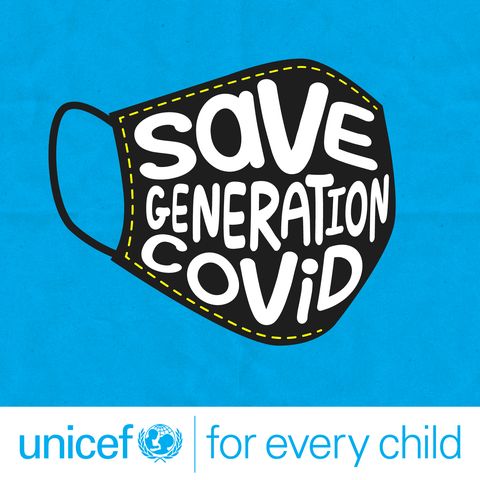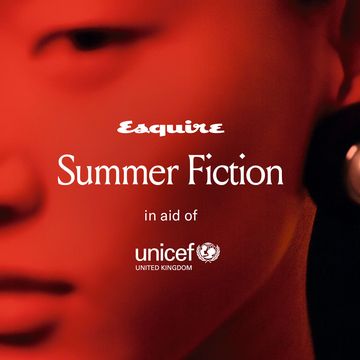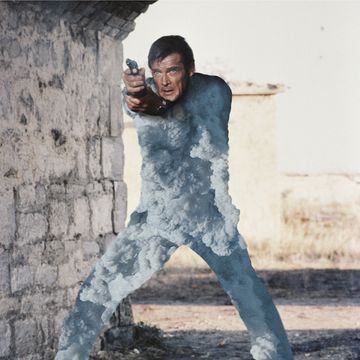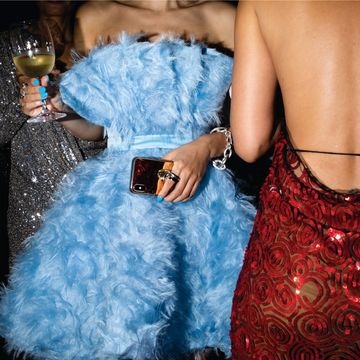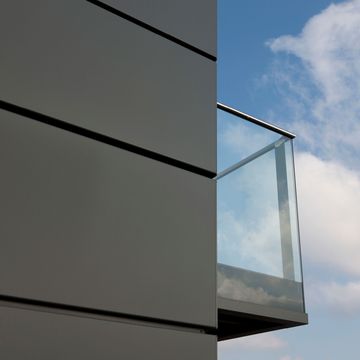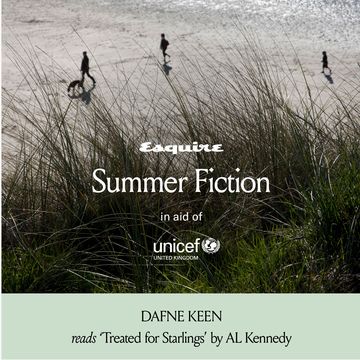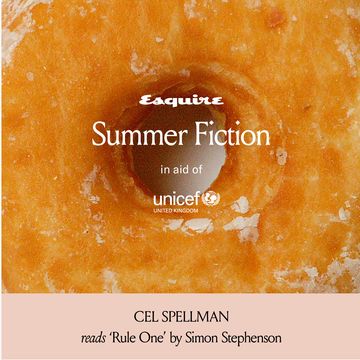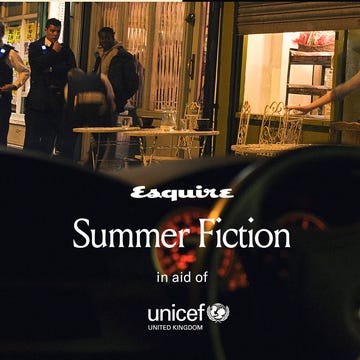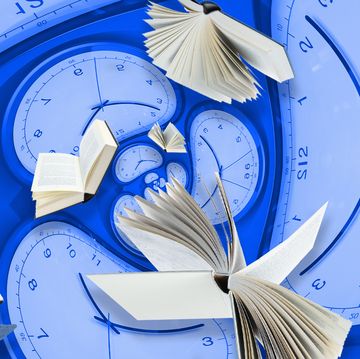Esquire's Summer Fiction series, in aid of Unicef UK, brings together some of the world's finest writers, and greatest actors, for a collection of original stories and readings that offer, we hope, a ray of light in these dark times, as well as the chance to raise funds for Unicef's Generation Covid campaign. (Read Unicef ambassador and Esquire editor-at-large Andrew O'Hagan's piece on why the campaign is so vital here).
Where a child is already experiencing hardship, outbreaks of diseases bring a new emergency to an already precarious situation. This is the story of Generation Covid. For vulnerable children all over the world, it poses the biggest threat since the Second World War. Please enjoy these stories, then visit Unicef UK's Generation Covid page to donate and hear a special message from Unicef UK High Profile Supporter Claire Foy.
DONATE NOW
Audio: read by Claire Foy
To listen, click 'Unmute' in the video at the top of this page. Alternatively, listen and download on SoundCloud, or listen on YouTube.
'The Greater Blue-Legged Bulbul' by Miranda Collinge
She’d been listening to the drip for days. Though the rain seemed to be easing, it was as steady as ever. Thunk. Thunk. Somehow the water was getting through, however many floors down they were, somewhere in the hold, which was, she noted, almost in admiration, the darkest place she’d ever been. The walls were coated in something black and pungent; even the cylinder of light slanting through the open porthole didn’t seem to be penetrating the blackness so much as getting sucked in by it. She could see only dimly the criss-cross of dried reeds that surrounded her on every side. Dank was the word. Dank. Dank. Dank.
“So…” he said.
“So,” she said, quickly. For a moment she’d forgotten he was there.
“You going to talk to me today?”
She exhaled. “Sure.”
“’Cos your attitude so far has been, you know. A little sucky.”
“I know,” she said. “I’m sorry. It’s not fair on you.”
“No, it’s not. We’re in the same boat, after all.”
“I know.”
His voice brightened. “What day do you think it is anyway? I’m thinking 25, 30.”
“It’s 37,” she said.
“Wow! Thirty-seven? No way. I would not have guessed. I would say time flies but, ha! You know.”
“Uh-huh,” she said.
“And seeing as we’re here, and it’s just us, we might as well keep each other company.”
“Hmm-hmm.”
She heard a rustle and saw him out of the corner of her eye, through the reed bars that separated them, step into the sloping column of light. He stood quietly, craning his head every which way to take in his surroundings, seemingly lost in thought, though she knew that he couldn’t be. He didn’t seem to notice her. He was, she had to admit, breathtakingly beautiful. The dark crest above his brow, the pale pink at his throat, the outrageous shock of blue at his feet.
All at once he was looking right at her.
“Were you checking me out?” he asked.
“No,” she said, crisply, and turned back to her pile of seeds.
“Ha ha! You were too! You were totally checking me out!” He gave a small, delighted hop.
She went back to pecking, keeping her eyes trained firmly towards the floor of her cage. She could feel him looking — blinking dumbly — and she sensed the sudden sideways movement as he cocked his head. He looked away, up to the ceiling, as though noticing the drip for the first time and trying to locate its source. He looked at her again.
“Where was it you said you were from anyway?”
“Oh, you know, around,” she looked up to gauge his interest; he returned her gaze, blankly. “Kind of near the almond groves, towards the river, near the bend with the big rock in the middle,” she replied, not lifting her head.
“Okaaay! I had an aunt over that way, though she and my mother didn’t get along so well. I’m from the hillside, as you know; I think you can see it from down there. Mother nested up higher because it was leafier, less crowded, and a bit more, I don’t know, civilised maybe. No one in each other’s faces all day. Did you tell me that before? That you were from the groves?”
“I think so, yes.”
He was already looking wistfully towards the porthole as he spoke. “So, you have any idea why they chose you?”
Chose. It didn’t seem quite the right word. There’d been three of them huddled together, looking for grubs under the shade of a tamarisk, cooing and bustling and busy in their work. She’d felt the hands before she’d seen them, the fingers fastening around her rib-cage, the palms flattening her wings, the woman’s thumbs on the sides of her throat, keeping her head from turning. She had felt herself being lifted up, the other two scrabbling away in different directions, their wings batting the tamarisk’s pink flowers as they made their escape. When the lid of the wicker basket closed over her head, she remembered how the world had gone dark.
“Just lucky, I guess,” she said.
“Huh,” he said. “You know — and I realise this may sound arrogant — but I kind of knew it would be me. I just…” He gazed towards the light, his yellow eyes drifting out of focus. “Knew.”
“How come?”
“Well…” he laughed, sheepishly. “There aren’t a lot of us around, as you know, so when it started happening to all the others, the pipits, and the sandpipers, the redshanks, and the thick-knees — I mean, come on, the thick-knees!? — it just seemed like they’d come for us too. I made a point of keeping on top of my grooming, making sure my plumage was on point” — he looked at her expectantly — “I mean, I don’t know if you’ve noticed the sheen on my wingbar but I’ve been buffing my coverts pretty meticulously, even in here…”
“They’re nice,” she said. “Very shiny.”
His chest flushed. “Aw, thanks. I just knew that they’d want to make sure they got a good one.”
“Right,” she said. “I don’t know, with me it just felt a bit more… arbitrary.”
“I can imagine!” he laughed. “No, no. I’m just kidding. I’m sure they took you for a good reason. I know we get all the glitz but,” he looked sympathetically at her breast, “there’s something homely about all those taupes and browns. I bet you blend right in.”
“Except when it matters!” She laughed abruptly, but he didn’t. She realised he was waiting. “So, how did they get you?” she obliged.
“Ha! Well, I was obviously keen to be the one — we all were — but I didn’t want to make it easy for them. Men like the thrill of the chase as you know! You want this” — he fanned his tail, gave a coy dip of his head — “you’re going to have to earn it! Am I right?”
She laughed, flatly.
“I was out on my own for the morning; it was one of those super-nice days when the crocuses are peeking out on the lower hills but there are still snow blotches on the peaks. I was flying over the valley and I saw a couple of the younger guys, the sons I guess, walking under the date palms with a whole bunch of baskets and cages on this kind of wooden cart thing. It wasn’t hard to twig what they were doing.
“I thought to myself, ‘OK, let’s do this,’” and I pulled off one of my — ha, if I do say so myself! — next-level flying displays. It was one of the really complex ones, with all the loop-the-loops and swoops, and I was doing as much trilling as I could and making sure that the sun caught my leading edge just so. It must have been kind of spectacular to see. I know it felt good. And then — just to mess with them a little — I landed right on the top of the tallest palm I could see. It must have been 30ft high. It was honestly hilarious. They were so mad.”
“But they got you down somehow?” She was annoyed that she wanted to know.
“Well, I sat on the top of that tree for a long, long time. I could see them looking up at me and pointing, so I knew they were interested. Then I see the smallest one — Ham, maybe? — start shinning his way up the trunk towards me. Like I said, it was a tall tree, and even though it was early morning, the air was already heating up and I could hear his grunts and see the sweat on his forehead as he got near the top.
“Then — and this is the best part — when he was almost up to the crown, and I could see him holding out the net, using all the strength in his other arm not to fall off, I glided, graceful as can be, all the way down to the ground and landed right in front of the one with the scraggly beard.”
“Shem.”
“Yeah, right, Shem, and I let him scoop me right up. Ha! If he hadn’t put me in that basket quick I think Ham would have straight-up wrung my neck!”
“Wow,” she said. “They must have really wanted you.”
“Yeah,” he looked shyly at the floor. “I guess they did.”
“Do you know what happened to any of the others?” she asked.
“The others?”
“You know, the ones they didn’t pick.”
“Well, I guess we kind of know, don’t we?”
“Yes. I suppose we do.”
She looked out towards the porthole. Was it still raining? In the flat light it was hard to tell. The sea, dark grey and angry, stretched out to the horizon. She tried not to think about her mother, her sisters, her brothers, who would have flown as far and for as long as they could before exhaustion won over and they dropped like rocks. She hoped none of them had been the ones that they’d heard about who’d tried to land on the deck, while the sons and their wives had flapped furiously at them with their sleeves and everything was a flurry of squawks and feathers and globs of bird shit. Eventually, rumours spread that the old man had let the tigers loose to pace up and down and the birds had stopped coming.
“Anyway,” he spun around once, twice. “This place isn’t really so bad, right? Plenty of fresh air, some good seed, a nice pile of soft leaves…”
She did not follow his gaze.
“How’s your nest-building, by the way?” he asked.
“Well, to be honest, I’ve never tried.”
“Oh.” He looked disappointed. “So that’s OK. You’re young. But I guess you can learn! And what about bugs and stuff? You know how to find the good ones? I don’t want our kids — our future kids, I mean — getting skinny now!”
“I get by.”
“Well, you can learn that too, I suppose. It just so happens I come from a long line of expert bug-hunters — my mother said Dad was honestly one of the very best — and I’m sure I can give you a few pointers when it’s time to get started.”
“Thank you,” she said. “That’s kind.”
“Speaking of getting started,” he said, cocking his head towards the pile of leaves, “and no pressure from me, of course, but — ha! — what do you think folks do for fun around here?”
“Wow, I don’t know,” she said. “But I think there are bars here for a reason.” She gestured towards the panel of reeds between them. “They don’t want the place to be overrun. And anyway, this is no place for an egg.”
“Ha! Right. Of course. Well maybe we just keep talking then. Talking is good. I could talk all day. How far did we get last time?”
“Let’s see… You listed what you like to eat, ran through some favourite songs, you mentioned you’ve got sisters and a brother...”
“Ha! I don’t know if we should be using the present tense anymore.”
“Oh yes, sure. Sorry. ‘Had’ I mean.”
“Ah, don’t sweat it. We’re all adjusting, right? To be honest, we didn’t stick together too long after we hatched anyway. We all had places to be: my brother headed east because he heard there were some A-grade figs out that way, and my sisters got hitched pretty quick, so it was just me and Ma really, which was kind of how we liked it anyway. We were so close. But I know she’d be proud of me now. It was her dream. For me, I mean.”
“I had brothers and sisters too,” she said.
“No way!” he said. “That’s so cool. I mean, we’ve got so much in common.”
“Yes,” she said, feeling anxious now. She scrabbled around for another question. “What do you like doing for fun? When you’re not bug-hunting?”
“Oh yeah, that’s a good one! OK. Yeah, I guess I like hanging with my buddies, practising my aerobatics displays — like I say, you never know when they’re going to come in useful — and you know, just generally taking care of myself. Preening. Being the best version of me I can be.”
She waited for the return question but it didn’t come. What did she like anyway? Soaring over the marshes, feeling the warm air cushioning her breast feathers and wings, pressing her up. Watching the day break over the mountains, seeing the violent pinks creep up the sky. Curling up in the nest, nestling her beak under her wing, and her whole body into her mother’s. Yes, she thought. A selfish breed.
“To be honest,” he continued, “I think they’re pretty lucky to have me. Us, I mean. You don’t get a lot of specimens that look this good, that fly so well, that can spot a cricket from 50ft up. I mean, they didn’t call us Greaters for nothing.”
“I think it’s more of a size thing,” she said.
“What is?”
“Greater. It’s because we’re bigger. The Lessers are just a bit smaller than us, that’s all.”
“Well, it’s an interesting theory, but I respectfully disagree! Ma told me it was because our brains are bigger and our feathers are brighter, and you know, the whole package is just… more. But still…” His eyes became serious. “We have a duty to care for the others too, the weaker ones, it’s not their fault. It’s our job to be leaders. To step up.”
“You mean the Lessers? I’m not sure the Lessers are even on here to be honest. I mean, they had a lot to gather. And no disrespect, but they’re farmers, not zoologists. It’s kind of impossible they wouldn’t have missed a few.”
He seemed not to have heard. “And when this whole thing is over with, when they let us out of here — assuming that’s His wish, of course — we’ve got a serious job to do. Repopulating a whole species is going to take time and effort and commitment. We’ve got to be ready. But it’s going to be worth it. Can you imagine? A nest packed tight with little blue speckleds? A whole new, fresh world populated by us. Full of little mes. Ha! I mean, it’s going to be something else.”
She said nothing, but with a swift twitch of her head, turned towards the reed panel nearest the porthole. She snapped a frond in her beak and began twisting.
“Hey! What are you even doing?” he shouted. “You know they won’t like that.”
She could feel the reed straining, the fibres loosening. It was easier than she had expected. She realised, almost with a smile, that she could have done it days ago. Weeks.
“Look that’s not even funny, if they catch you doing that they’ll stop our seed supply for a week, and I need my food or I get super-cranky.”
There was a tiny snap-snap-snap as each fibre gave way to the next. With a final twist, the reed broke in two. She pushed her head between the frayed ends, wiggling her folded wings into the gap, feeling her breastbone squeezed tight, then she was out the other side, flapping madly in the close air. She reached the open porthole, and landed on its rim, breathing hard. Below her, the waves heaved and fell.
“Hey,” he said again, quieter this time, his crest raised like a question mark, his breast feathers flushing from pink to red. “If you even think about it, even think about it, I swear to you, it’s the end of us. The end.”
She looked at him, his yellow eyes blazing, his chest puffed. Sensational. She hoped she’d always think of him that way.
“I’ll take my chances,” she called to him, over her wing, as she took off towards the furious sea.
Miranda Collinge says:
"A year or so ago I made a note of a short story idea about a pair of birds on Noah’s Ark who don’t get along. It had occurred to me that the stakes of such a union would have been rather high – what with being responsible for the very survival of their species and all – and, if humans are anything to go by, the chances of compatibility somewhat slim. So, to be honest, I thought it might be funny.
"Then Covid-19 happened, and the idea of two characters stuck together in confined quarters against their will took on an unanticipated meaning, though I suspect the notion of being buffeted along by circumstances, of waking up and finding yourself in a place in your life that you didn’t really plan for (this is not my beautiful house, etc), was there all along. I’m sure we’ve all found ourselves gazing longingly at the porthole at various times during lockdown, but I’m at least grateful that the strange lull it provided finally prompted me to commit the idea to paper."
This story appears in the July/August issue of Esquire.
SUBSCRIBE NOW
Miranda Collinge is a writer and journalist, and the features director of Esquire UK.
Claire Foy is an award-winning British actress who has won a Golden Globe, a Primetime Emmy and two Screen Actors Guild Awards for her performance in Netflix's The Crown. She started her journey with Unicef UK when she travelled to Lesotho in February 2020. She visited a range of programmes to learn about Unicef’s work, including a young mothers' support group, a health centre to see maternal care and vaccinations and a school to see Unicef’s Water, Sanitation and Hygiene programme (WASH).
Visit Unicef UK's Generation Covid page to donate now.

Miranda Collinge is the Deputy Editor of Esquire, overseeing editorial commissioning for the brand. With a background in arts and entertainment journalism, she also writes widely herself, on topics ranging from Instagram fish to psychedelic supper clubs, and has written numerous cover profiles for the magazine including Cillian Murphy, Rami Malek and Tom Hardy.


